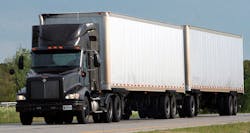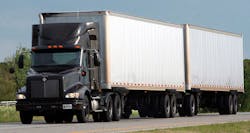Where environmentalists and highway safety advocates collide
That proposed extra 10 ft. is, of course, being battled vociferously by the usual highway safety advocates – along with their Congressional allies.
There's also been some pretty strong rhetoric thrown in for good measure as well. (This editorial by Joan Claybrook, president emeritus of the advocacy group Public Citizen, offers up a prime example.)
The interesting part is that several noted environmentalists believe making trucks longer – though not heavier – would actually aid in efforts to reduce air pollution and greenhouse gas production; putting them directly at odds with safety advocates.
(It also puts them at odds with the railroads, too, which fear longer trucks could take freight away from them. But that’s another story.)
For example, Carl Pope - who served as executive director of the Sierra Club from 1992 until 2010 – recently penned a letter to Harry Reid (D-NV), the minority leader in the U.S. Senate, to support legislative efforts to allow longer twin trailers to operate on U.S. highways.“As you and I have discussed, climate change has no silver bullet, but only silver buck-shot. We need to grab multiple opportunities to lower the waste of fossil fuels in our economy if we are going to stabilize our climate and protect our society,” Pope (seen at right) explained.
Trucking groups such as the Coalition for Efficient and Responsible Trucking (CERT) believe that extra 10 feet of total trailer length could eliminate 6.6 million truck trips per year – the equivalent of a 1.3 billion-mile reduction in truck traffic – while saving 204 million gallons of fuel annually, reducing carbon emissions by 4.4 billion pounds per year for good measure.
And it’s those latter numbers that get the attention of environmentalists like Pope.
“I have found no evidence in the testimony and submissions of those who oppose this change that it will impair safety, increase wear and tear on roads – but unequivocal evidence that it will save substantial amounts of otherwise wasted fuel, reduce the number of trucks on our highways, and make the trucking sector more efficient – perhaps as much as 16-18% more efficient for the segment impacted,” he noted in his letter.
“These are the kinds of opportunities that we need to grab – even when the industry in question may well need other vital reforms to enhance safety,” Pope emphasized. “When these kinds of opportunities come before Congress, our climate future requires us to seize them.”
How interesting indeed to find such “green advocates” backing truckers in this particular policy battle – though, you know, trucking is very “green” nowadays due to over a decade of intensive exhaust emission reduction mandates; not that anyone notices much.
[Something Kevin Knight of Knight Transportation pointedly noted in a speech six years ago.]
We’ll see if such “green support” helps pass this legislation or not soon here.


